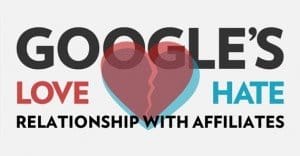Why Are Most Affiliate Links Bad for SEO?

Affiliate links themselves are not necessarily bad for SEO. Having an affiliate link isn’t really all that different from having a normal link with link parameters attached. Google can identify affiliate links, but their presence alone isn’t detrimental.
The problem with affiliate links is the people who tend to invest heavily into affiliate programs also tend to get a sort of affiliate tunnel vision. Rather than considering their site as a whole, as part of an industry microcosm, or as part of the greater Internet, they narrow down to incredibly niche sites that focus on one thing and one thing only; making money through that ever-valuable affiliate link.
The problem with this approach is that it leads to techniques that exploit loopholes in the Algorithm. Techniques that are either labeled black hat, or will be once Google finds a way to reliably combat them. For examples:
- Keyword stuffing was used with affiliate links to forge a page to show up highly for various search queries, even when those queries were unrelated. It wasn’t necessarily a good way to get affiliate conversions, but affiliate marketers back then would try anything.
- Copied content is an easy way to populate a blog such that the site looks active and valuable, without the user realizing the content was relentlessly stolen from the real valuable sites. Essentially, this is a form of lying directly to the user in pursuit of a sale.
- Low quality content was another way of making the site look fleshed out without actually supporting any content. If the user doesn’t look closer, they might not notice that the site doesn’t actually offer anything of value.
- Spun content is another way of fleshing out a site with pretty words that are ultimately meaningless. Like, if I posted this exact article, and then tomorrow posted “Why Most Affiliate Links Kill SEO” and then the next day posted “Are Most Affiliate Links Dangerous to Search Ranking?” All three posts would be full of the same content, said in different ways.
- Redirected pages might push a user through an affiliate link and push a cookie into their system without them ever realizing; once they reach the storefront they wanted, their purchase goes under the heading of an affiliate that they didn’t choose to support.
Basically any black hat technique you can think of today is something that someone in the past used to earn themselves illegitimate affiliate link clicks.
If you’re particularly paranoid about your affiliate links, you can add the nofollow attribute to them. This will help avoid passing PageRank you don’t want to pass, but it’s about all you need to do to safely use affiliate links from a technical standpoint.
Google’s Stance on Disclosure
Google considers full disclosure to be very important in legitimate, successful affiliate marketing. The reason for this, actually, does not come from Google; it comes from the United States Federal Trade Commission. The FTC has some strict rules on how you’re able to present affiliate links, updated in March of 2013 to reflect modern times.
By “modern,” we mean pretty much everything. The previous iteration of the guide was published in 2000, before smartphones, before Twitter, before Facebook, before Windows XP. The guide is just a modern explanation of the ongoing consumer protection laws and how they apply to affiliate marketing, as well as other forms of online marketing.
- You need disclosure of ads. This is why Facebook ads are always labeled, Google promoted posts are highlighted and twitter ads begin with “Ad:”. Not having space – like on Twitter – is not an excuse.
- Disclosure should be positioned before the message. This is why promoted blog posts begin with a disclosure, and why sponsorship messages begin with sponsored notifications.
- Disclosure has to be obvious. You can’t hide it white-on-white behind an image or something equally obtuse. You also need to be aware of mobile devices, and how your disclosure displays on a mobile screen.
- A link to a dedicated disclosure page is not enough. It may be necessary in the case of a lengthy legal disclosure, but it alone is not sufficient.
To make things clear, here:
- The FTC publishes consumer protection laws that marketers must follow under threat of corrective actions.
- The FTC publishes a guide that helps explain these laws through examples.
- The FTC does not go around policing minor affiliate marketers; however, that is not a valid excuse to ignore them.
- Google assists the FTC by acknowledging the laws and guidelines, and penalizes marketers who violate them.
Google is essentially a “soft penalty” that might occur before you cross enough lines to earn the FTC’s attention.
All of that said, what other affiliate issues might lead to SEO penalties?
Too Many Affiliate Links
Neither Google nor users tend to like high concentrations of links, particularly affiliate links. You can see in this example, someone who had their niche affiliate site penalized due to a profusion of Amazon affiliate links in one page. Amazon is one of the least penalized and most legitimate affiliate networks available, and even their links bring up a penalty when they’re stacks on top of each other like logs.
The problem here is the sheer concentration of links. His comparison matrix for products is very potent, but with multiple affiliate links per product and so many products in one place, it looks bad from a code standpoint. Cutting back on those links – maybe linking to product pages with more robust descriptions, with affiliate links on those pages – would be a better idea.
Bad Incoming Links
This one comes back to tunnel vision. Affiliate links make money on clicks and conversions. To boost clicks, you need more traffic. To get more traffic, get more links. Thus, link building. Poor quality link building is very much black hat, as are shady link schemes, so it’s a good idea to avoid them.
Besides, if you’re making your site a niche authority, you should have no trouble building valuable links.

 ContentPowered.com
ContentPowered.com





